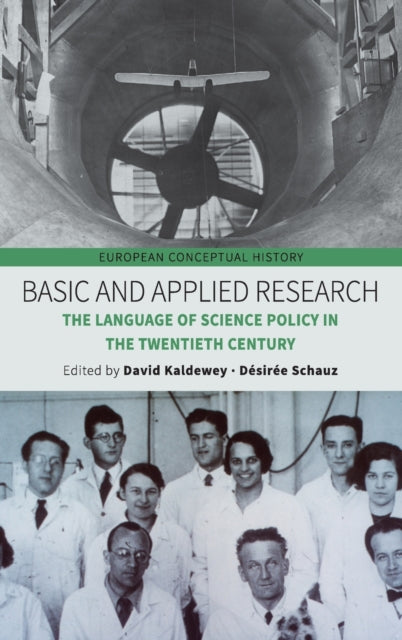Shulph Ink
Basic and Applied Research: The Language of Science Policy in the Twentieth Century
Basic and Applied Research: The Language of Science Policy in the Twentieth Century
- Condition: Brand new
- UK Delivery times: Usually arrives within 2 - 3 working days
- UK Shipping: Fee starts at £2.39. Subject to product weight & dimension
Bulk ordering. Want 15 or more copies? Get a personalised quote and bigger discounts. Learn more about bulk orders.
Couldn't load pickup availability
- More about Basic and Applied Research: The Language of Science Policy in the Twentieth Century
The book explores the historical development of the basic-applied distinction in science and policymaking, tracing its roots from the nineteenth century to the present. It examines how this distinction has been reconceived in response to rapid scientific progress and geopolitical circumstances.
Format: Hardback
Length: 312 pages
Publication date: 25 April 2018
Publisher: Berghahn Books
The distinction between basic and applied research has played a pivotal role in twentieth-century science and policymaking, and while it has been subject to debate in recent years, it continues to permeate both scientific and public discourse. This volume adopts a transnational, diachronic perspective, drawing upon historical semantics to trace the evolution of the basic-applied distinction from the nineteenth century to the present day. It explores European developments alongside comparative case studies from the United States and China, shedding light on how an older dichotomy of pure and applied science was reconceived in response to rapid scientific progress and subsequently shaped by geopolitical circumstances in the postwar era.
The distinction between basic and applied research has been a subject of significant debate in recent years. On the one hand, some argue that it is essential to maintain a clear distinction between these two types of research in order to ensure that scientific progress is driven by fundamental principles and that applied research is focused on solving real-world problems. On the other hand, others argue that the distinction between basic and applied research is outdated and that there is much overlap between these two fields.
One of the key arguments in favor of maintaining the basic-applied distinction is that it helps to ensure that scientific research is driven by fundamental principles. Basic research is typically focused on exploring new ideas and developing a deeper understanding of the natural world. This type of research is often funded by government agencies and universities and is aimed at advancing our knowledge of the universe and solving some of the most pressing scientific questions of our time.
On the other hand, applied research is typically focused on solving real-world problems. Applied research is often funded by private companies and other organizations and is aimed at developing new technologies, products, and services that can improve people's lives and promote economic growth. Applied research can take many different forms, including engineering, medicine, and social science.
Despite the arguments in favor of maintaining the basic-applied distinction, there are also arguments against it. One of the main criticisms is that the distinction between basic and applied research is often blurred, and that many scientific discoveries have had both basic and applied implications. For example, the development of the Internet was driven by basic research in computer science, but it has had a profound impact on many different fields, including commerce, entertainment, and education.
Another criticism of the basic-applied distinction is that it can create barriers to scientific progress. For example, researchers who are focused on basic research may not have access to the resources and funding that are necessary to develop new technologies and products. This can lead to a lack of innovation and a stagnation of scientific progress.
In conclusion, the distinction between basic and applied research has been a subject of significant debate in recent years. While some argue that it is essential to maintain a clear distinction between these two types of research in order to ensure that scientific progress is driven by fundamental principles, others argue that the distinction is outdated and that there is much overlap between these two fields. The debate is likely to continue for many years to come, as scientists and policymakers work to navigate the complex relationship between basic and applied research and ensure that scientific progress is driven by both fundamental principles and real-world needs.
Weight: 580g
Dimension: 161 x 237 x 23 (mm)
ISBN-13: 9781785338106
This item can be found in:
UK and International shipping information
UK and International shipping information
UK Delivery and returns information:
- Delivery within 2 - 3 days when ordering in the UK.
- Shipping fee for UK customers from £2.39. Fully tracked shipping service available.
- Returns policy: Return within 30 days of receipt for full refund.
International deliveries:
Shulph Ink now ships to Australia, Belgium, Canada, France, Germany, Ireland, Italy, India, Luxembourg Saudi Arabia, Singapore, Spain, Netherlands, New Zealand, United Arab Emirates, United States of America.
- Delivery times: within 5 - 10 days for international orders.
- Shipping fee: charges vary for overseas orders. Only tracked services are available for most international orders. Some countries have untracked shipping options.
- Customs charges: If ordering to addresses outside the United Kingdom, you may or may not incur additional customs and duties fees during local delivery.


